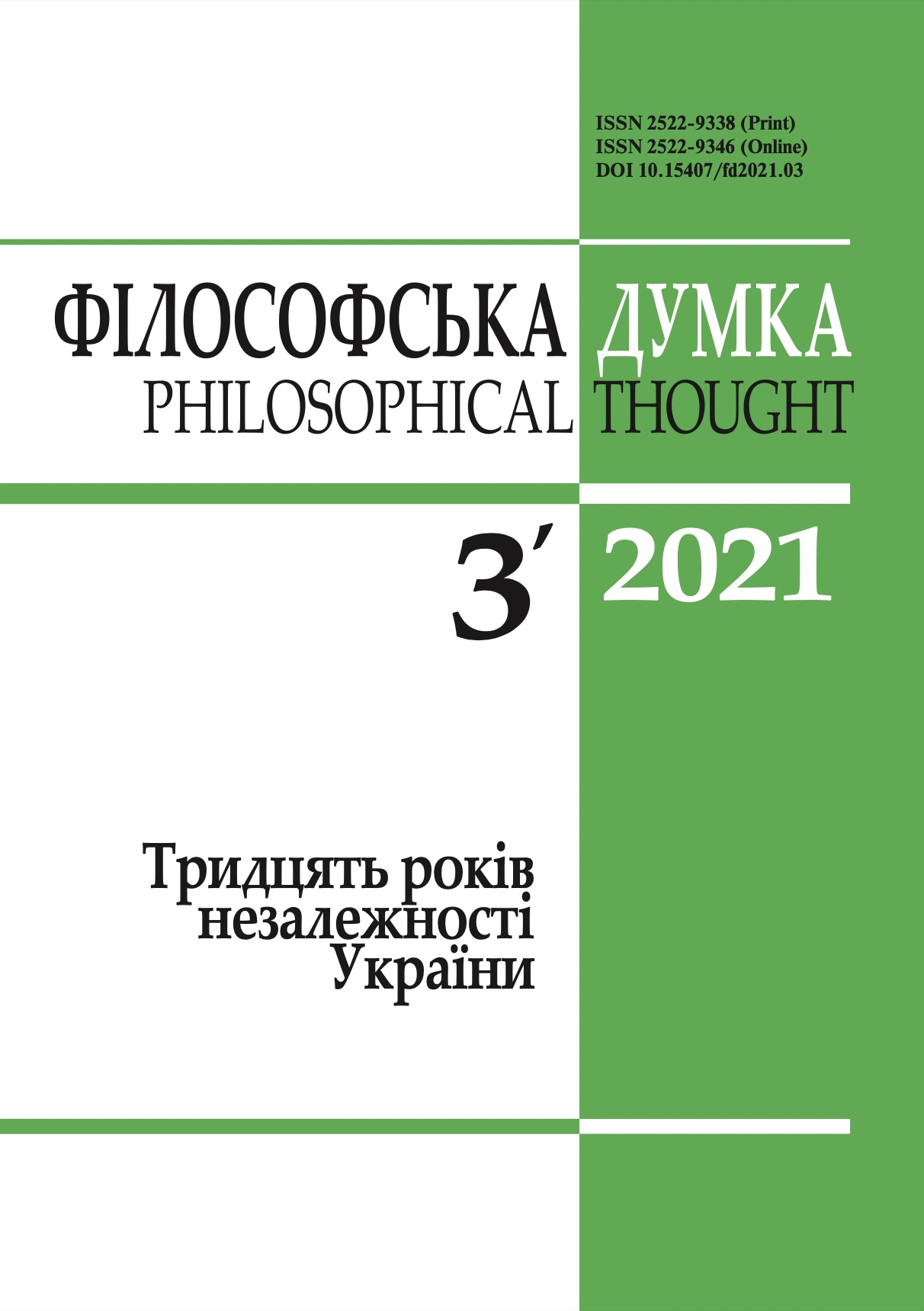PROBLEMATIZATION AND MODIFICATION OF PHENOMENOLOGICAL CONCEPT OF EXPERIENCE IN MARTIN HEIDEGGER`S FUNDAMENTAL ONTOLOGY
COMPETITION OF YOUNG RESEARCHERS FOR THE NELLA IVANOVA-GEORGIEVSKAYA PRIZE
DOI:
https://doi.org/10.15407/fd2021.03.138Keywords:
Dasein, fundamental ontology, phenomenology, existentialism, transcendentalism, European philosophy, Heidegger studies in UkraineAbstract
The aim of the paper is to justify the view of Martin Heidegger’s concept of Dasein as a recon- ceptualization and modification of Edmund Husserl’s concept of experience (Erfahrung). The subject of analysis is Heidegger's concept “Dasein”, which is one of the most problematic concepts of the entire Heidegger's legacy due to ambiguity of its meaning and the resulting variability of possible interpretations. Specific attention is paid to examining the ontological reading of Heidegger's philosophy as opposed to both existentialist and anthropological ones; the author also textually argues for its legitimacy.
Author textually proves that Dasein indeed is a modification of Husserl`s concept of experience. Moreover, she claims that not only the concept of Dasein but fundamental ontology itself may be seen to some extent as an original modification of Husserl’s phenomenology. For not only one of the key phenomenological concepts gets modified, but also its method of exploration and some crucial topics (e. g. the temporality of consciousness) get modified and incorporated in Heidegger’s fundamental ontology project.
References
Bogachov, A. (2011). Experience and Sense. [In Ukrainian]. Kyiv: Dukh i Litera.
Husserl, E. (2018). Experience and Judgment. Investigations in A Genealogy of Logic. [In Ukrainian] Kharkiv: Folio.
Zborovska, X., & Dakhniy, A. (2020). Martin Heidegger: embeddedness in tradition. Xenija Zborovska's interview with Andrii Dakhniy. [In Ukrainian]. Filosofska Dumka, (1), 80-92.
https://doi.org/10.15407/fd2020.01.080
Dakhniy, A. (2012). Martin Heidegger's Project of Hermeneutical Phenomenology in the Context of the Evolution of his Thinking. [In Ukrainian]. Sententiae, 26 (1), 69-81.
https://doi.org/10.22240/sent26.01.069
Kebuladze, V. (2015). "Lebenswelt" by Husserl and "Dasein" by Heidegger: problems of translation. [In Ukrainian]. Filosofska Dumka, (5), 99-108.
Kebuladze, V. (2017). Phenomenology of Experience. [In Ukrainian]. Kyiv: Dukh i Litera.
Kebuladze, V. (2011). Phenomenology as Transcendental Empirism. [In Ukrainian]. Actual problems of spirituality, 12, 81-89.
https://doi.org/10.31812/apd.v0i12.1777
Kobets, R. (2019). On Heidegger's concept of ontology. [In Ukrainian]. Filosofska Dumka, (1), 60-73.
Matiukh, T. (2011). Heidegger's interpretation of Humanism: extramural discussion with Sartre. [In Ukrainian] Retrieved from: http://www.irbis-nbuv.gov.ua / http://nbuv.gov.ua/UJRN/ Nznuoafs_2011_8_36.
Pascal, D. (2011). Heidegger's Dasein. [In Ukrainian]. In: Cassin, B., Sigov, C., Vasylchenko, A. (Eds.), European Dictionary of Philosophies. Lexicon of intransitives (vol. 2, pp. 18-19). Kyiv: Dukh i Litera.
Pöggeler, O. (2019). Novye puti s Khaydeggerom. [In Russian]. Saint Petersburg: Vladimir Dal' Publ.
Yermolenko, V. (2011). Heidegger's Dasein: from beings to Being. [In Ukrainian]. In: Cassin, B., Sigov, C., Vasylchenko, A. (Eds.), European Dictionary of Philosophies. Lexicon of intransitives (vol. 2, pp. 20-21). Kyiv: Dukh i Litera.
Von Herrmann, F.-W. (2012). Hermeneutics and Reflection: Heidegger and Husserl on the Concept of Phenomenology (New Studies in Phenomenology and Hermeneutics). Toronto: University of Toronto Press.
https://doi.org/10.3138/9781442670150
PMid:23283866
Heidegger, M. (1972). On Time and Being. New-York: Harper & Row. Heidegger, M. (1977). Sein und Zeit. Frankfurt/Main: Vittorio Klostermann
Downloads
-
PDF (Українська)
Downloads: 237
Published
How to Cite
Issue
Section
License
Authors who publish with this journal agree to the following terms:
- Authors retain copyright and grant the journal right of first publication.
- Authors are able to enter into separate, additional contractual arrangements for the non-exclusive distribution of the journal's published version of the work (e.g., post it to an institutional repository or publish it in a book), with an acknowledgement of its initial publication in this journal.
- Authors are permitted and encouraged to post their work online (e.g., in institutional repositories or on their website) prior to and during the submission process, as it can lead to productive exchanges, as well as earlier and greater citation of published work (See The Effect of Open Access).


